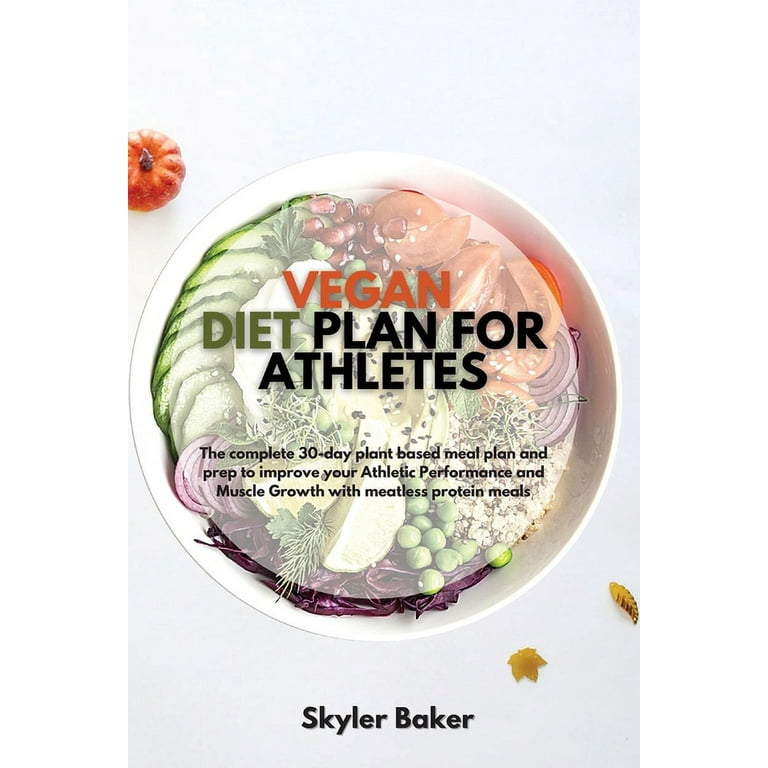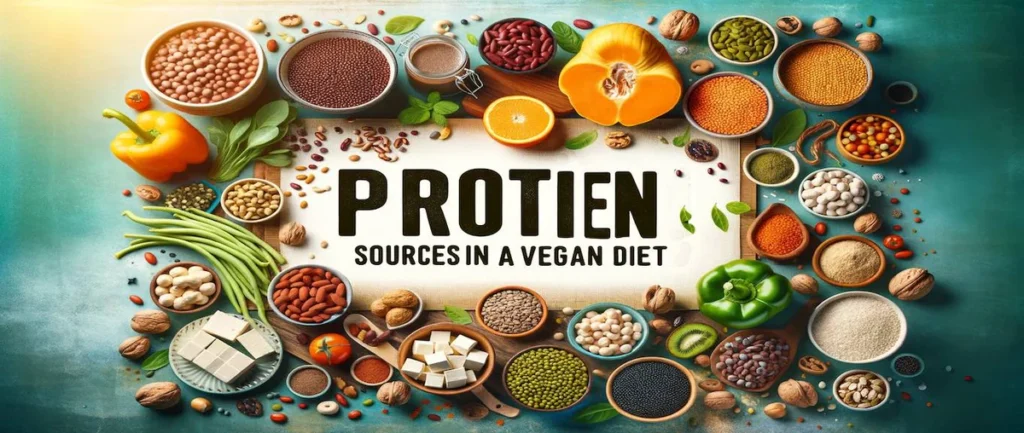A complete guide to vegan protein sources for athletes includes tofu, tempeh, lentils, quinoa, chia seeds, and hemp seeds. These plant-based options offer essential nutrients and amino acids necessary for muscle recovery and strength building.
As more athletes turn to veganism for health and ethical reasons, knowing the best sources of vegan protein becomes crucial for optimal performance. Plant-based proteins not only support muscle growth, but also aid in overall endurance and recovery. This guide will explore various vegan protein sources and their benefits, helping athletes make informed dietary choices for improved athletic performance.
Whether you’re a competitive athlete or a fitness enthusiast, understanding the benefits and sources of vegan protein is essential for achieving peak physical condition.
Why Vegan Protein Is Essential For Athletes
Vegan protein is essential for athletes due to its ability to provide the necessary nutrients for muscle recovery, strength building, and overall athletic performance. Unlike animal-based protein, vegan protein sources offer high-quality amino acids, antioxidants, and essential nutrients without the harmful effects of saturated fats and cholesterol. Incorporating vegan protein into your diet can support your athletic goals while promoting overall health and well-being.
Benefits Of Vegan Protein For Athletes
Vegan protein offers a range of benefits for athletes, including improved muscle recovery, reduced inflammation, and enhanced endurance. Plant-based protein sources such as soy, pea, and hemp provide essential amino acids and micronutrients that are vital for maintaining optimal athletic performance. Moreover, vegan protein supports cardiovascular health and promotes efficient energy metabolism, enabling athletes to perform at their best while minimizing the risk of chronic diseases associated with animal protein consumption.
How Vegan Protein Boosts Athletic Performance
- Vegan protein enhances muscle recovery and repair
- Supports overall cardiovascular health
- Reduces inflammation and oxidative stress
- Provides essential amino acids for muscle building

Credit: www.amazon.com
Top Vegan Protein Sources For Athletes
Athletes on a vegan diet often seek high-quality protein sources to support their active lifestyle and muscle recovery. This complete guide will cover top vegan protein sources, focusing on soy protein, pea protein, hemp protein, rice protein, and pumpkin seed protein to help athletes meet their nutritional needs.
Soy Protein
Soy protein is a complete protein with all essential amino acids, making it ideal for muscle building and repair. This plant-based protein can be found in foods such as tofu, edamame, and tempeh. Including soy protein in an athlete’s diet can help maintain muscle mass and support overall performance.
Pea Protein
Pea protein is derived from yellow split peas and offers a high protein content. It’s easily digestible and rich in essential amino acids, making it beneficial for muscle recovery and growth. Athletes often incorporate pea protein powder into their post-workout shakes for a convenient protein boost.
Hemp Protein
Derived from hemp seeds, hemp protein is a complete protein source that also provides essential fatty acids. Its rich nutrient profile makes it beneficial for athletes seeking muscle repair and sustained energy. Hemp protein can be added to smoothies, baked goods, or oatmeal for a nutrient-dense meal option.
Rice Protein
While rice protein may not be a complete protein on its own, it can be combined with other plant-based sources to create a complete amino acid profile. It’s easily digestible and free from common allergens, making it a suitable option for athletes with dietary restrictions. Including rice protein in meals can contribute to muscle maintenance and recovery.
Pumpkin Seed Protein
Rich in protein, healthy fats, and fiber, pumpkin seed protein offers a valuable nutritional source for athletes. It provides essential minerals such as magnesium and zinc, which are important for muscle function and immune support. Adding pumpkin seed protein to smoothies or energy bars can enhance an athlete’s nutrient intake.
How To Incorporate Vegan Protein Into Your Diet
As an athlete following a vegan diet, it’s essential to ensure that you are meeting your protein requirements to support your active lifestyle. With the wide variety of plant-based protein sources available, incorporating vegan protein into your diet is easier than ever before. In this section, we will explore Calculating Protein Requirements for Athletes, Meal and Snack Ideas for Athletes, and Creating Balanced Vegan Meals.
Calculating Protein Requirements For Athletes
Determining your protein requirements is the first step in effectively incorporating vegan protein into your diet. It’s vital to consume enough protein to support muscle growth, recovery, and overall performance. A simple way to calculate your protein needs as an athlete is to multiply your body weight in kilograms by 1.2 to 2.0 grams.
Meal And Snack Ideas For Athletes
Having a variety of meal and snack options is crucial for athletes looking to meet their protein needs. Below are some vegan-friendly meal and snack ideas:
| Meal | Idea |
|---|---|
| Breakfast | Smoothie bowl topped with hemp seeds, chia seeds, and sliced almonds. |
| Lunch | Quinoa salad with mixed vegetables, chickpeas, and a tahini dressing. |
| Dinner | Grilled tofu and vegetable kabobs served with brown rice. |
- Snack: Rice cakes topped with almond butter and banana slices.
- Snack: Protein-packed energy bars made with nuts, seeds, and plant-based protein powder.
Creating Balanced Vegan Meals
To create well-rounded vegan meals, it’s important to include a combination of protein, carbohydrates, and healthy fats. This ensures that you’re fueling your body properly for optimal performance. Here are some tips for creating balanced vegan meals:
- Incorporate a variety of plant-based protein sources such as legumes (beans, lentils, chickpeas), tofu, tempeh, seitan, and edamame.
- Add complex carbohydrates like quinoa, brown rice, sweet potatoes, and whole grain bread to provide sustained energy.
- Include plenty of colorful fruits and vegetables to provide essential vitamins and minerals.
- Don’t forget about healthy fats! Incorporate sources like avocado, nuts, seeds, and olive oil into your meals.
By following these guidelines and incorporating vegan protein sources into your diet, you can easily meet your protein needs as an athlete and thrive on a plant-based diet.
Choosing The Right Vegan Protein Supplements
When following a vegan diet, it’s important to ensure you’re getting enough protein to support your athletic performance and recovery. While there are plenty of plant-based protein sources available, sometimes it can be challenging to meet your daily protein requirements through food alone. This is where vegan protein supplements can be beneficial. In this section, we will explore the different types of vegan protein supplements and the factors to consider when choosing the right one for you.
Different Types Of Vegan Protein Supplements
There are several types of vegan protein supplements available on the market. Here are some popular options:
- Powdered Protein Supplements: These supplements are made by extracting protein from various plant sources such as peas, rice, hemp, or soy. They are usually sold in powdered form that can be easily mixed into shakes, smoothies, or added to recipes.
- Protein Bars: Protein bars are a convenient, on-the-go option for athletes. They contain a blend of plant-based proteins, along with other ingredients to provide a quick and easy protein boost.
- Protein Powders with Added Nutrients: Some vegan protein powders are enriched with additional nutrients like vitamins, minerals, or probiotics. These can provide an extra nutritional boost for athletes.
Factors To Consider When Choosing Supplements
When selecting vegan protein supplements, it’s important to consider the following factors:
| Factor | Consideration |
|---|---|
| Protein Content | Ensure the supplement has a sufficient amount of protein per serving, ideally around 20-30 grams. |
| Amino Acid Profile | Look for a supplement that provides a complete amino acid profile, including essential amino acids like leucine, isoleucine, and valine. |
| Source of Protein | Consider the source of protein used in the supplement. Different sources may have varying absorption rates and digestion speeds. |
| Ingredient Quality | Check the ingredient list to ensure the supplement is free from artificial additives, sweeteners, and unnecessary fillers. |
| Allergen Considerations | If you have any food allergies or sensitivities, ensure the supplement is free from ingredients that may trigger a reaction. |
| Taste and Texture | If possible, try a sample or read reviews to determine if you enjoy the taste and texture of the supplement. |
By considering these factors, you can choose a vegan protein supplement that aligns with your nutritional needs and preferences. Remember to consult with a healthcare professional or registered dietitian for personalized advice.
Tips For Maximizing Vegan Protein Absorption And Utilization
In order to achieve optimal results in athletic performance, it is essential for vegan athletes to pay special attention to maximizing protein absorption and utilization. By following these simple tips for maximizing vegan protein absorption and utilization, athletes can ensure that their bodies are getting the nutrients they need to perform at their best.
Pairing Plant-based Foods For Complete Protein
One of the most important aspects of maximizing protein absorption and utilization is to pair plant-based foods that complement each other to form a complete protein. By combining different types of plant-based proteins, the amino acid profiles can be enhanced, resulting in a more well-rounded source of proteins. Some examples of complementary protein combinations include:
| Food | Complementary Food |
|---|---|
| Beans (black, kidney, chickpeas) | Rice, quinoa, corn |
| Nuts (almonds, cashews) | Whole grain bread, oats |
| Seeds (chia, hemp, flax) | Soy products (tofu, tempeh) |
By pairing these plant-based foods, athletes can ensure they are getting a complete set of essential amino acids, which are the building blocks of protein.
Optimizing Digestion And Nutrient Absorption
In addition to pairing plant-based foods to maximize protein absorption, it is equally important to optimize digestion and nutrient absorption. This can be achieved through simple lifestyle and dietary adjustments, such as:
- Eating smaller, more frequent meals throughout the day to aid digestion and absorption.
- Chewing food thoroughly to break it down into smaller particles for better digestion.
- Adding digestive enzymes to meals to improve nutrient breakdown and absorption.
- Avoiding high-fat meals before or after intense workouts, as fats may slow down digestion.
- Drinking enough water throughout the day to maintain proper hydration and support digestion.
By implementing these habits, athletes can ensure that their bodies are efficiently breaking down and absorbing the nutrients necessary for optimal athletic performance.

Credit: www.amazon.com

Credit: www.walmart.com
Frequently Asked Questions On Complete Guide To Vegan Protein Sources For Athletes
What Are The Best Sources Of Protein For Vegan Athletes?
Great sources of protein for vegan athletes include legumes, such as beans and lentils, tofu, tempeh, seitan, and soy products. Quinoa, chia seeds, hemp seeds, and nutritional yeast are also excellent options. These plant-based foods provide essential amino acids and support muscle recovery and growth.
How To Get 150g Of Protein A Day Vegan?
To get 150g of protein a day on a vegan diet, focus on plant-based sources like lentils, tofu, tempeh, chickpeas, quinoa, and seitan. Incorporate protein-rich snacks like nuts, seeds, and nut butters, and consider using vegan protein powders in shakes and smoothies.
What Is The Protein Macronutrient Recommendations For A Vegan Athlete?
A vegan athlete should aim for 1. 2 to 2. 0 grams of protein per kilogram of body weight to support muscle recovery and growth. This can be achieved through plant-based sources like lentils, quinoa, tofu, and tempeh. Meeting protein needs is essential for optimal athletic performance.
What Are The Top 5 Sources Of Protein For A Vegan?
Top 5 vegan protein sources include tofu, lentils, quinoa, chickpeas, and hemp seeds.
Conclusion
To sum up, this comprehensive guide has provided athletes with a wealth of vegan protein sources to enhance their performance and support their muscle growth. By incorporating plant-based foods like legumes, whole grains, nuts, and seeds into their diet, athletes can meet their protein requirements while reaping the numerous health benefits associated with a vegan lifestyle.
With these alternative protein options, athletes can fuel their bodies while contributing to a more sustainable and compassionate world.
